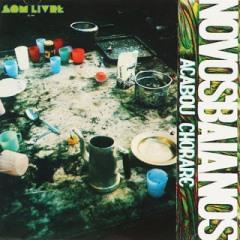Novos Baianos - Acabou Chorare (1972)
Novos Baianos - Acabou Chorare (1972)

1. Brasil Pandeiro (3:56) 2. Preta Pretinha (6:40) 3. Tinindo Trincando (3:25) 4. Swing de Campo Grande (3:10) 5. Acabou Chorare (4:12) 6. Mistério do Planeta (3:39) 7. A Menina Dança (3:52) 8. Besta É Tu (4:25) 9. Um Bilhete para Didi (2:53) 10. Preta Pretinha (reprise) (3:23) Personnel: Baby Consuelo – vocal, percussão (maracas, triângulo e afoxé) Paulinho Boca de Cantor – vocal, percussão (pandeiro) Pepeu Gomes – guitarra elétrica, violão solo, craviola, arranjos Moraes Moreira – vocal, violão base, arranjos Dadi Carvalho – baixo elétrico Jorginho Gomes – bateria, cavaquinho, bongo
Acabou Chorare (No More Crying in English) is the second album by the Brazilian musical group Novos Baianos. Released as a Long Play in 1972 by Som Livre, after the partial success of É Ferro na Boneca (1970). Adopting the expressive guitar of Jimi Hendrix and the "brasilidade" of Assis Valente, and mainly the strong influence of João Gilberto, who also served as a mentor of the group at the time of recording the album, the group held a work that shows a great versatility of musical genres.
Its opening track, "Brasil Pandeiro", was proposed by Gilberto and it is one of the two sambas, the other being "Recenseamento", which Valente composed for the arrival of Carmen Miranda in the United States; she accepted the second, but disregarded the first, which was forgotten until the recording by Anjos do Inferno. The album title and its self-titled (song were inspired in the Bossa nova style of Gilberto and in a story told by him about his daughter with Miúcha, Bebel Gilberto (who was still a baby), and represents the main idea of the project: criticize the sadness and melancholy that was in charge in Brazilian music with joy and pleasure. As the album most successful hits, we can mention "Preta Pretinha", "Besta É Tu" and "Tinindo Trincando", the latter being a good example of the baião-psychedelic rock fusion.
40 years after its release, the album continues to be one of the most important and influent of the Brazilian music in general. The new generation of Brazilian singers, especially women like Vanessa da Mata, Marisa Monte, CéU, Roberta Sá and Mariana Aydar cite the album as one of the strongest inspirations. In 2007, in the "The 100 Greatest Albums of Brazilian Music" by Rolling Stone, Acabou Chorare came at the first position, being considered a masterpiece by specialists, producers and journalists called for the pool. ---wikipedia
download (mp3 @160 kbs):
oboom yandex 4shared mega mediafire zalivalka cloudmailru uplea
Last Updated (Tuesday, 29 December 2015 17:29)








